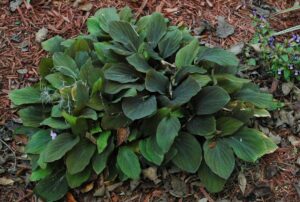S & J Nursery’s Guide to Growing
Kaempferia pulchra
Bronze Peacock Ginger
in the Northeast Florida Landscape
Bronze Peacock Ginger / Kaempferia Bronze  Peacock Origins:
Peacock Origins:
– Another member of the zingiberaceae ginger family plant that is native to tropical Asia. Kaempferias are commonly known as peacock ginger, named from their highly decorative foliage.
Sun Exposure of Bronze Peacock Ginger :
– Plant Peacock Ginger in a shady garden location in the Northeast Florida landscape. Or use as an indoor garden plant!
Foliage of the Kaempferia pulchra Bronze Peacock Ginger :
– Foliage of Bronze Peacock Ginger is low growing , reaching only 10-12 inches in height.
– Foliage is winter dormant and is an excellent substitution for Hosta’s in our Jacksonville and St. Augustine area landscape.
– Pretty foliage has a bronze tone on the surface of the leaf and a pale pattern.
– Gingers are a rhizomatous perennial plant, that is they grow and spread from underground rhizomes ( thick stem like roots, very similar to the more familiar Iris family of plants ) and form clumps of foliage. They can be dug and divided and replanted with just the rhizome or both rhizome and foliage stalks successfully into other garden locations with ease.
Soil Preferences of the Bronze Peacock Ginger :
– Kaempferia’s prefer moist garden locations, amend generously with compost if planting in dryer or sandy soil land capes to help the soil retain moisture.
– Salt tolerance is poor.
Size Variance of the Kaempferia pulchra Bronze Peacock Ginger :
– I love the tidy habit that Peacock Ginger keeps. The foliage lays almost flat, making the overall plant height even on larger clumps less than a foot high, and can form large clumps up to 2 ft across. Or dig and divide every 3-5 years for more plants!
Kaempferia Ginger Growth Habit:
– Clumping perennial rhizomes forms an attractive, low spreading mound of foliage. Excellent groundcover planting.
Growth Rate of the Bronze Peacock Ginger :
– Moderately fast growing Ginger selection, expect them to reach full size potential within their third growing season in the landscape when planted into moist shady garden areas.
Blooms on the Bronze Peacock Ginger :
– Although the foliage of these showy garden plants tend to be the main attraction, I do fall in love with these dainty little satiny or almost iridescent looking lavender blooms each year. They remind me of a large, iridescent African violet bloom. The blooms are tucked up into the center of the plants foliage and area lovely lavender color.
– Blooms are born in the late summer and fall on Kaempferia plants.
Water Requirements of the Kaempferia / Bronze Peacock Ginger Plant:
– Moist soils are a necessity with these lovely Kaempferia plants. Although much more durable once established in the landscape, regular water is necessary to get the plant rooted and growing on its own after being
planted in the ground from an S & J Nursery container. Amend the soil generously when planting and use supplemental irrigation through a professionally designed irrigation system or hand water with a hose bi-weekly when planted in drier soil situations.
Best Uses For Kaempferia Bronze Peacock Ginger in the Jacksonville | St. Augustine Area Landscapes :
– Use as an indoor house plant!
– Wonderful replacement for the much beloved Hosta that Northern gardeners miss here in the Northeast
Florida landscape.
– Use as the edge of the border plant along walkways, shady drives, patios etc.
– Beautiful in masses under large canopy trees.
– Kaempferia do well as potted plants as long as they are irrigated.
Care of Kaempferia Bronze Peacock Ginger in the North Florida Landscape:
– Low care landscape pant selection when planted into rich soils. Amend soil generously with compost or cow manure when planting for best results.
– Water every day during the establishment period after planting in the garden from an S & J Nursery container.
– Ginger plants will need good water during the establishment period and supplemental irrigation during dry spells or particularly hot dry summers, especially when planted into sandier soils.
– Fertilize each spring with a handful of garden compost or a mixture of Milorganite or Green Edge Fertilizer and a slow release poly coated plant food such as Osmocote or Stay Green general purpose plant food or 10-10-10.

